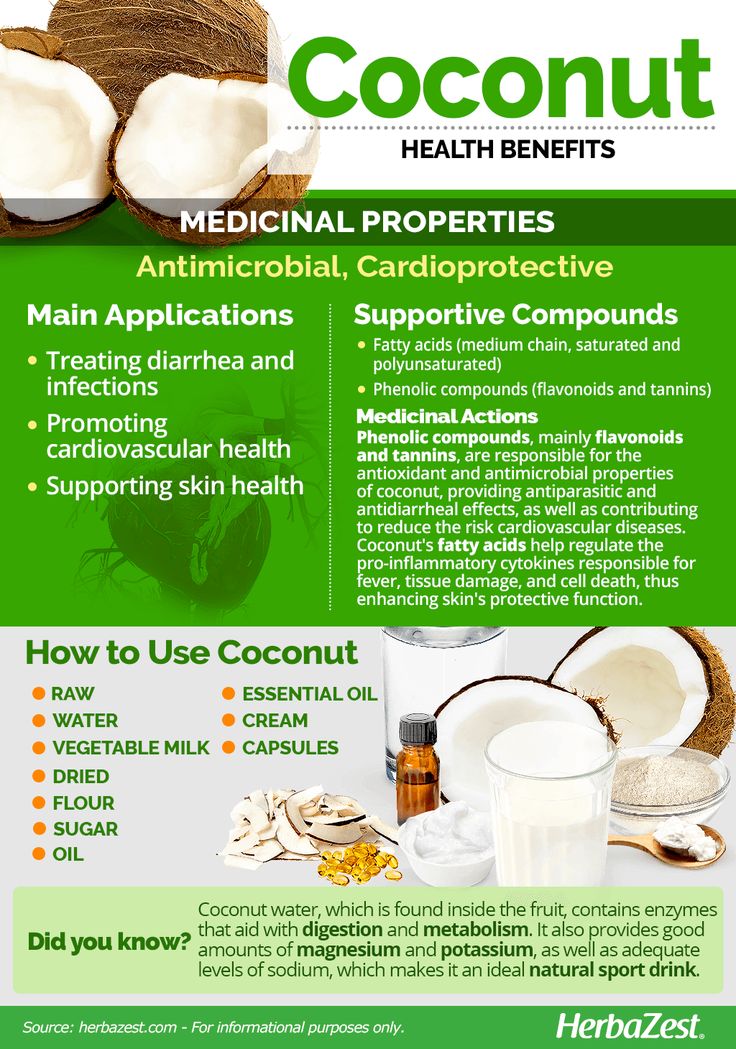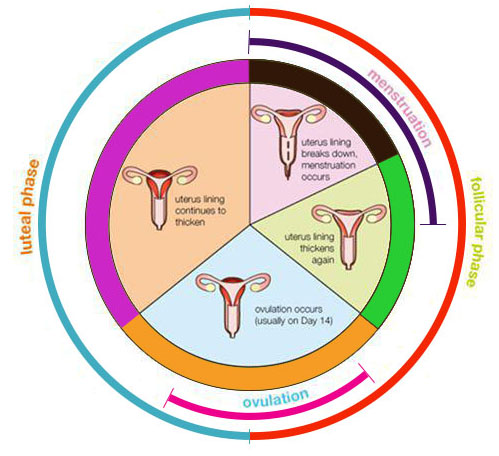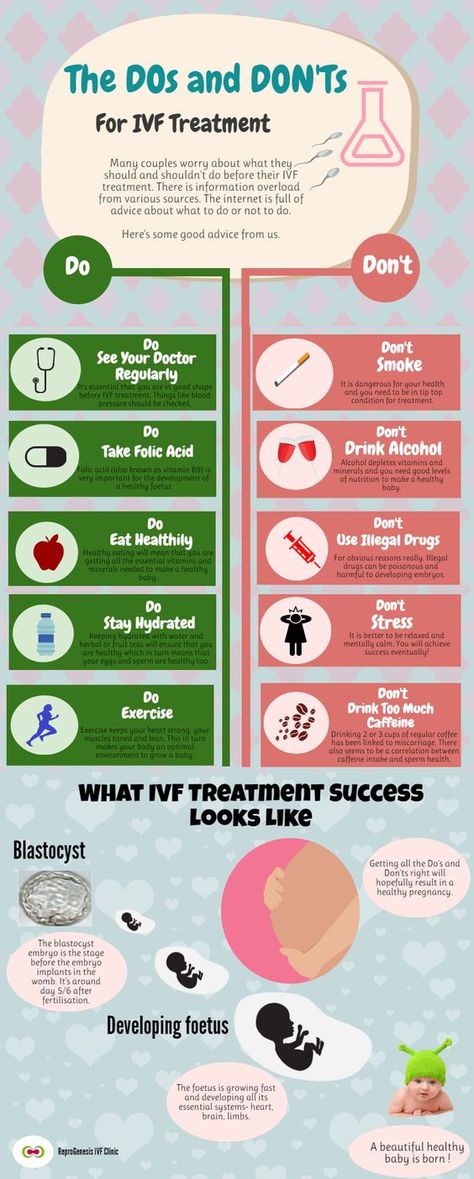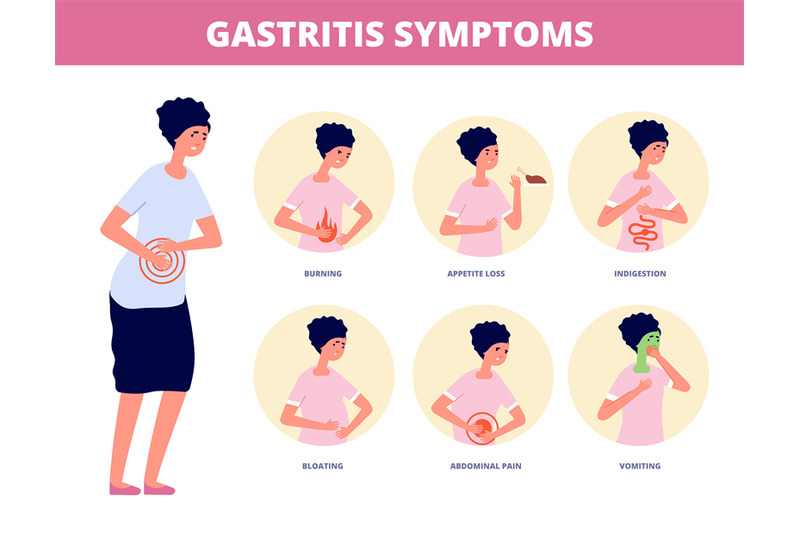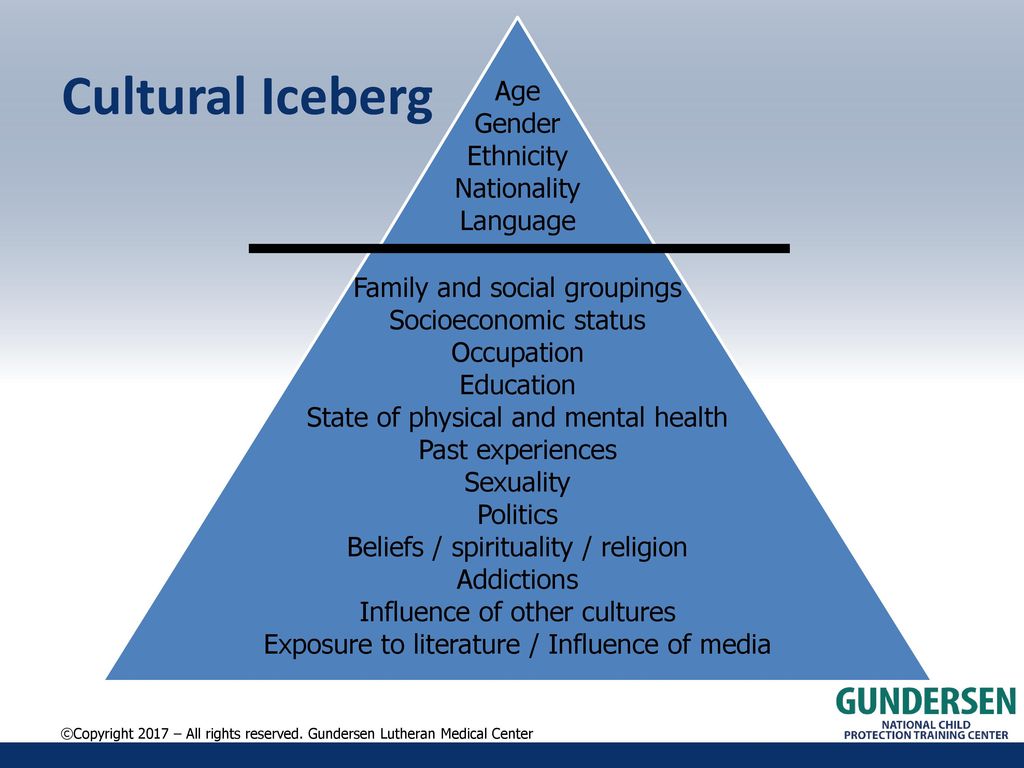Coconut milk allergy baby
Is It a Good Idea?
Coconuts are all the rage these days.
Celebrities are investing in coconut water, and all of your yoga friends are drinking it after Savasana. Coconut oil has gone from junk food pariah to a “superfood” in a few short years. Nutritionists now tout it as an amazing health food that can help you burn fat.
And coconut milk — that silky indulgence that makes your Thai curries so irresistible — is suddenly also a paleo staple.
But is it good for your baby?
Well, it depends. Using coconut milk in place of breast milk or formula is a no-go. Studies suggest that even cow’s milk on its own can lead to iron deficiencies and severe dehydration in babies. Coconut milk definitely doesn’t do the trick. There’s simply no substitute for the complete nutrition babies get from breast milk or infant formula.
Some would say there’s no substitute for breast milk, period, given its unparalleled immunity protection, allergy resistance, and a slew of lifelong health benefits for both mother and child.
If breastfeeding isn’t an option and you’re using a milk-based formula, watch out for symptoms of a dairy (or milk protein) allergy or intolerance in your baby. Symptoms of a dairy allergy or intolerance may include:
- skin rashes
- diarrhea
- vomiting
- stomach cramps
- difficulty breathing
- blood in stool
If your baby’s having trouble with dairy, your doctor may recommend a soy-based formula. If your baby’s allergic to soy, too, you can also find elemental formulas that are hypoallergenic.
In any case, your pediatrician will not point you to coconut milk as an alternative.
What about coconut milk for kids who have passed their first birthday? Could it take the place of cow’s milk in their lunchboxes?
Giving kids too much canned coconut milk can be dangerous. Canned coconut milk is wildly high in saturated fat. One cup of the liquid has 57 grams of fat and 255 percent of your daily allowance of saturated fat. That’s more than 10 times the saturated fat content of full-fat cow’s milk, which has 8 grams of fat total. While saturated fats found in plants differ somewhat than animal-based saturated fats, it’s still a good idea to keep saturated fat intake to a minimum.
That’s more than 10 times the saturated fat content of full-fat cow’s milk, which has 8 grams of fat total. While saturated fats found in plants differ somewhat than animal-based saturated fats, it’s still a good idea to keep saturated fat intake to a minimum.
Commercial brands of coconut milk beverages are diluted with water and contain far less fat than the canned variety. In terms of fat content, they’re more in line with low-fat cow’s milk. But they can also contain sweeteners and thickeners, like guar gum or carrageenan, which parents might want to avoid. The good news is that they’re fortified with nutrients like B12, iron, calcium, and vitamin D.
You can make your own coconut milk with grated coconut. But your homemade coconut milk wouldn’t be fortified with some of the vitamins and minerals you find in the boxed drink.
If you’re looking for an alternative to dairy, experts may recommend the nutritional offerings of soy over coconut milk (providing you don’t have a soy allergy).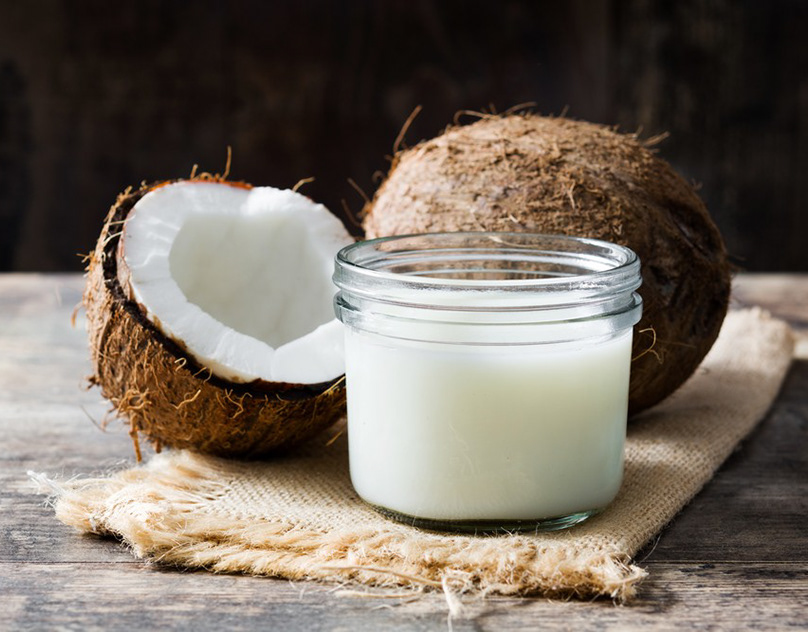 Other options include flax milk with added protein, or hemp milk. Unsweetened versions are always the best.
Other options include flax milk with added protein, or hemp milk. Unsweetened versions are always the best.
Coconut milk does get some credit for its high content of lauric acid, a fatty acid also found in breast milk (though in completely different proportions). Lauric acid helps protect against infections and bacteria. Your body also burns it faster than other fatty acids.
Coconut milk is also a good source of niacin, iron, and copper. If your older kids like coconut milk or coconut water, it’s fine to let them have it. But be aware that the canned and cold beverage versions of coconut milk don’t contain protein. They’re not equal replacements for dairy milk, which contains 8 grams of protein per cup.
If you’re turning to coconut beverages because your child’s allergic to cow’s milk, soy, or other nut milks, beware. Coconut is also a potential allergen, though the allergy isn’t nearly as common.
Despite its FDA classification as a tree nut, it’s technically a fruit in the cherry family, so your nut-allergic kid might not have a reaction to it.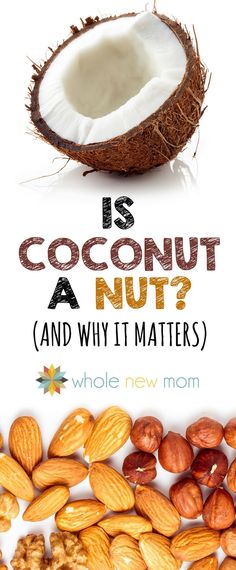
Cooking with coconut milk is also fine — delicious, even! Once your child is eating solid foods, they’ll probably enjoy some sweet, mild coconut curry or a tropical coconut smoothie.
Right Age, Benefits And Precautions
It is nutrient-dense and supports immunity but may be avoided due to certain limitations.
Research-backed
MomJunction believes in providing reliable, research-backed information to you. As per our strong editorial policy requirements, we base our health articles on references (citations) taken from authority sites, international journals, and research studies. However, if you find any incongruencies, feel free to write to us.
Many parents have been exploring the nutritional benefits of coconut milk for babies since it is a popular plant-based milk alternative. Of course, substituting coconut milk for breast milk or infant formula is a no-go. However, you may add a little coconut milk to the weaning baby’s or toddler’s diet.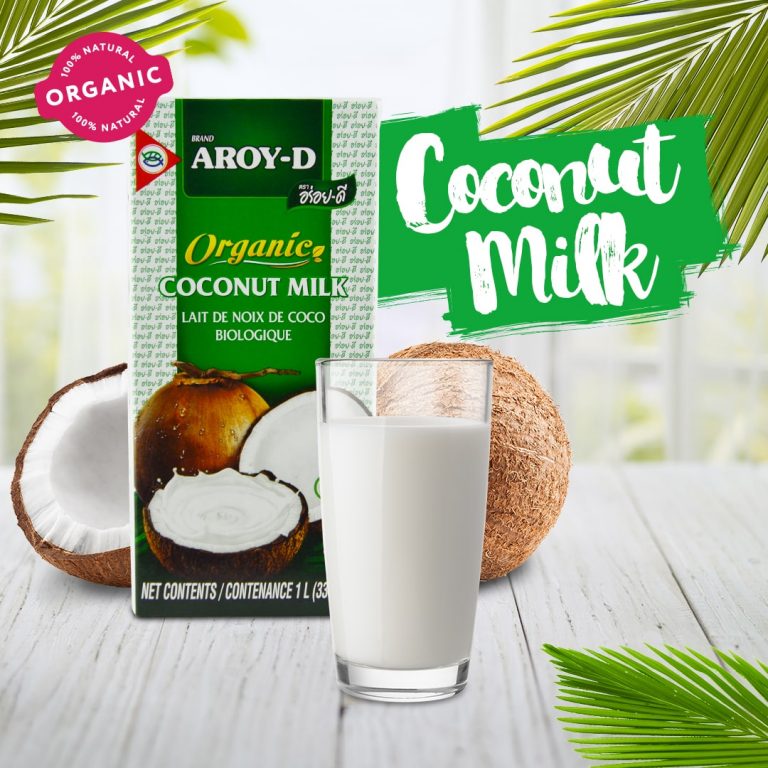
Coconut milk is obtained from mature coconut pulp. Its peculiar taste and creamy texture make it a common choice in savory and sweet recipes. Although it cannot substitute breastmilk, it has nutritional and therapeutic properties. Therefore, it is best to opt for fresh coconut milk prepared at home than canned coconut milk.
Read on to know the benefits of coconut milk and some interesting recipes with coconut milk for babies and toddlers.
When Can You Introduce Coconut Milk To Your Infant?
Babies older than 12 months may have calcium-fortified coconut milk as the main drink (1). If you wish to introduce coconut milk sooner, adding it to the baby’s weaning food is suitable (2). You could try coconut milk-based cheese, yogurt and desserts for babies older than six months occasionally (3). In any case, consult a pediatrician before giving coconut milk to the baby.
Related: Top 10 Healthy Baby Weaning Foods And How To Start Them
Nutritional Value Of Coconut Milk
The nutritional composition and qualities of coconut milk vary depending on the quality of coconut pulp. Coconut milk sold as a dairy alternative, that is, a milk substitute, is fortified with nutrients, such as calcium and vitamin D.
Coconut milk sold as a dairy alternative, that is, a milk substitute, is fortified with nutrients, such as calcium and vitamin D.
One fluid ounce (30.5g) of coconut milk fortified with calcium, vitamins A, B12, and D offers the following nutrients (4) (5).
| Nutrients | Amount | RDA (12-36months) |
|---|---|---|
| Water | 28.8g | – |
| Energy | 9.46kcal | – |
| Protein | 0.064g | – |
| Total lipid (fat) | 0.634g | – |
| Carbohydrate, by difference | 0.891g | – |
| Calcium, Ca | 57.3mg | 500mg |
| Potassium, K | 5.8mg | 1000mg |
| Sodium, Na | 5.8mg | 225mg |
| Vitamin A | 63µg | 400µg |
| Vitamin B12 | 0.63µg | 0.7µg |
| Vitamin D | 1µg | 10µg |
Sources: US Department of Agriculture and World Health Organization
Coconut milk is often considered an alternative for lactose intolerant babies.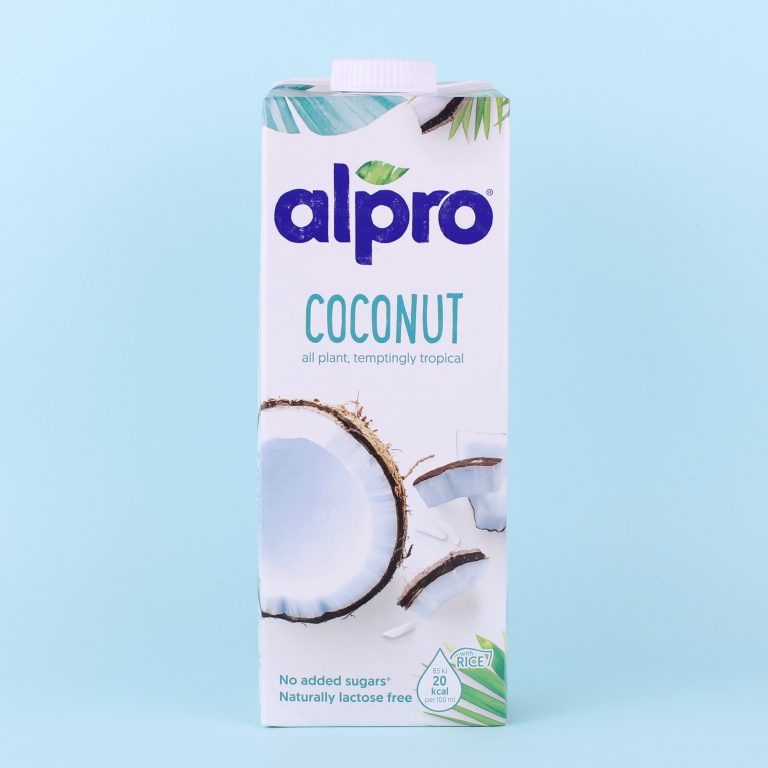 However, whether to use coconut milk for a baby is a decision you need to make with a pediatrician. Some other dairy alternatives are soy milk, rice milk, oats milk, almond milk, and hemp milk.
However, whether to use coconut milk for a baby is a decision you need to make with a pediatrician. Some other dairy alternatives are soy milk, rice milk, oats milk, almond milk, and hemp milk.
Related: When Babies Can Have Soy Milk, And Myths About Soy Formula
Possible Health Benefits Of Coconut Milk For Babies
Coconut milk has nutritional elements, such as medium-chain triglycerides and bioactive compounds that could benefit health over time (6) (7). Below are some notable benefits of coconut milk that a baby may reap.
- Offers nutrients: Coconut milk is calorie-rich, has high amounts of saturated fat and minerals (8). This nutritional profile could make it a good choice for babies who need these nutrients to maintain their rapid growth and development.
- Improves digestion: Coconut milk is considered to improve digestion and alleviate constipation through its high water content and bioactive compounds (9).
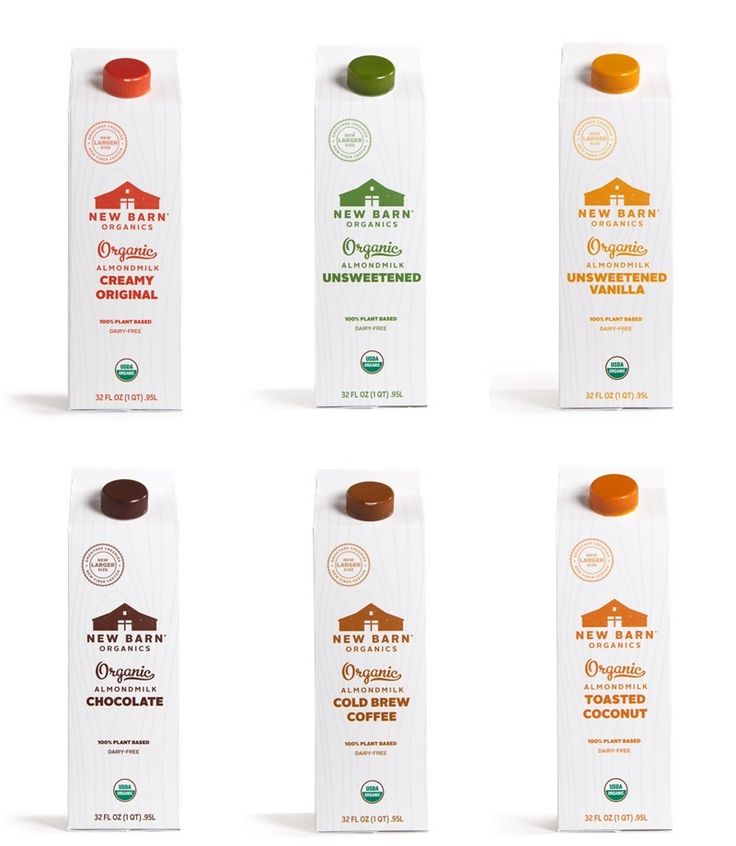 However, clinical evidence to support this theory is limited.
However, clinical evidence to support this theory is limited.
- Strengthens immunity: The nutritional components of coconut milk could stimulate the immune system (10). Also, it contains bioactive compounds possessing antioxidant properties. The medium-chain triglycerides (MCTs), such as lauric acid, present in coconut milk, may help fight infections and illnesses (11).
- Supports brain development: Research shows that coconut milk contains considerable amounts of saturated fatty acid (10). These fatty acids may support the baby’s healthy brain development in the long run.
Besides these, coconut milk may also reduce inflammation and promote heart health over time.
Related: Signs Of Bacterial Infections, Causes, Diagnosis, & Treatment
Possible Side Effects Of Coconut Milk For Babies
Although coconut milk offers certain benefits, its use among babies is not promoted.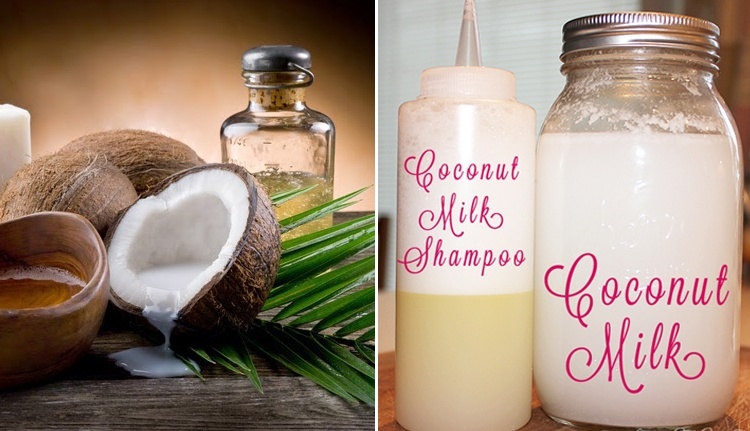 One cup of coconut milk offers 0.51g of protein, which is significantly lower protein than whole cow milk, which contains 7.69g of protein (12). Also, coconut milk is high in saturated fat, which may fill your baby’s little tummy and suppress their appetite for breast milk or formula milk, and other foods. It will be a good idea to keep saturated fat intake to a minimum.
One cup of coconut milk offers 0.51g of protein, which is significantly lower protein than whole cow milk, which contains 7.69g of protein (12). Also, coconut milk is high in saturated fat, which may fill your baby’s little tummy and suppress their appetite for breast milk or formula milk, and other foods. It will be a good idea to keep saturated fat intake to a minimum.
Commercial coconut milk, usually sold as a milk substitute, is often diluted and may contain artificial sweeteners and thickeners (10). These compounds may not be good for the baby’s health, and parents might want to avoid. Coconut is also a potential allergen though the allergy is not as common.
Note: If you wish to use coconut milk for cooking, use canned coconut milk specifically made for cooking purposes.
Precautions To Take While Using Coconut Milk For Babies
Here are some precautions to observe while using coconut milk for babies.
- Prefer to buy packaged coconut milk from a reputable and trusted brand.
 Look for no-sugar options fortified with essential nutrients, such as calcium and vitamin D.
Look for no-sugar options fortified with essential nutrients, such as calcium and vitamin D.
Point to consider
Look for BPA-free labels on cans or plastic containers of commercial coconut milk.
- Introduce coconut milk as a part of other foods, such as mash, puree, or porridge. Keep the intake occasional as its protein and calcium content is not enough. Being rich in calories and fats, it can keep your baby full for longer and suppress its appetite.
- Begin by feeding a teaspoon of coconut milk as a part of food preparation and gradually increase the intake to a tablespoon and then to two.
- After ingesting coconut milk, if the baby experiences discomfort or shows signs of sensitivity or intolerance, discontinue feeding, and try later.
- Allergy after eating coconut is rare, but the allergic reaction after touching coconut, called contact dermatitis, is relatively common (13).
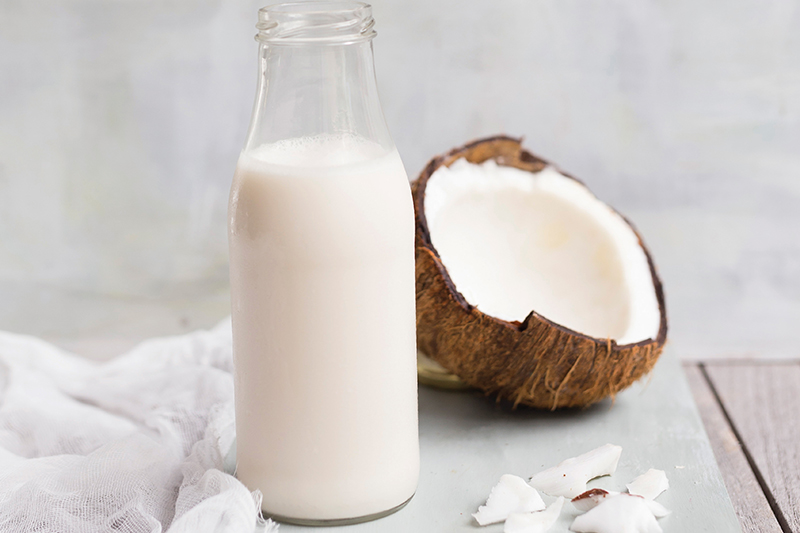 If the baby has an existing dermatitis condition or a family history of skin allergies, consult a doctor before introducing coconut milk.
If the baby has an existing dermatitis condition or a family history of skin allergies, consult a doctor before introducing coconut milk.
- Cross-reactivity of coconut with walnut and hazelnut has been reported. Most individuals with a tree nut allergy can eat coconut and its products (14). Nevertheless, if your baby has nut or other food allergies, consult a doctor before introducing coconut milk.
- Serve coconut milk as a drink to toddlers occasionally. Plain coconut milk, coconut milkshake, and coconut milk smoothie are some options to try.
- Keep the intake of coconut milk occasional, even for older toddlers. Toddlers older than two years should consume low-fat foods for effective weight management and optimum heart health (15).
Quick tip
Coconut milk goes well with fish and meats and enhances their flavor.
Healthy Coconut Milk Recipes For Babies And Toddlers
Below are some easy-to-prepare, healthy coconut milk recipes that can enhance the nutritional value of your baby’s diet.
1. Coconut milk puree (6 months+)
Image: Shutterstock
You will need:
- ¼ cup mango puree
- ¼ banana puree
- ½tsp dry fruit powder
- 2tbsp coconut milk
How to prepare:
- Mix all the ingredients in a mixing bowl thoroughly. Ensure no lumps are present.
- Transfer some amount in a feeding bowl and feed the baby. Store the remaining amount in an airtight container in the refrigerator for no more than two days.
2. Creamy lentil veggie curry (8 months+)
Image: Shutterstock
You will need:
- 50g red lentil (cooked)
- ½ cup corn kernels
- ½ carrot (peeled and finely chopped)
- ½ capsicum (finely chopped)
- 1 small onion(finely chopped)
- ½ cup coconut milk
- 1½ cup water
- 2tbsp olive oil
How to prepare:
- Heat the oil in a frying pan over low heat.
 Add onions and fry them until they turn golden brown.
Add onions and fry them until they turn golden brown. - Stir in the lentil, corn kernels, carrot, and capsicum. Cook for five minutes until the veggies turn soft.
- Add water and coconut milk to the mixture and bring to boil over medium heat.
- Lower the flame, cover the pan and simmer the mixture for 15 to 20 minutes.
- When the lentils are soft, turn off the heat and set the pan aside to cool. The curry is ready.
- Mash or blend to appropriate texture before feeding it to the baby.
Quick tip
Adding a tablespoon of fresh tomato puree can impart a tangy flavor to the dish.
3. Sago and coconut milk porridge (10 months+)
Image: Shutterstock
You will need:
- ¼ cup sago (washed, drained, and soaked)
- 1 cup coconut milk
- 1cup water
- 1tsp dry fruit powder
- ⅛ tsp cardamom powder
How to prepare:
- Boil coconut milk and water mix in a saucepan over low heat.

- Add cardamom powder, dry fruit powder, and sago. Cook for seven to eight minutes while stirring occasionally. Ensure no lumps are present.
- As the milk boils, it will thicken. Add more water to adjust the porridge’s consistency.
- Once the mixture thickens as desired, turn off the flame, and set the porridge aside to cool. Pour some porridge into a feeding bowl and feed.
4. Banana and coconut milk smoothie (12 months+)
Image: Shutterstock
You will need:
- 1 cup coconut milk
- 1 mashed banana
- ½tsp jaggery
- 1tsp dry fruit powder
How to prepare:
- Blend all the ingredients into a smooth-flowing smoothie in a blender. Ensure no lumps are present.
- Pour the smoothie into a serving glass and serve.
- You can add more seasonal fruits, such as mango, peach, berries, and pineapple.
Quick tip
Coconut milk can be easily made at home by adding 4 cups of warm water to 2 cups of shredded fresh coconut and blending them.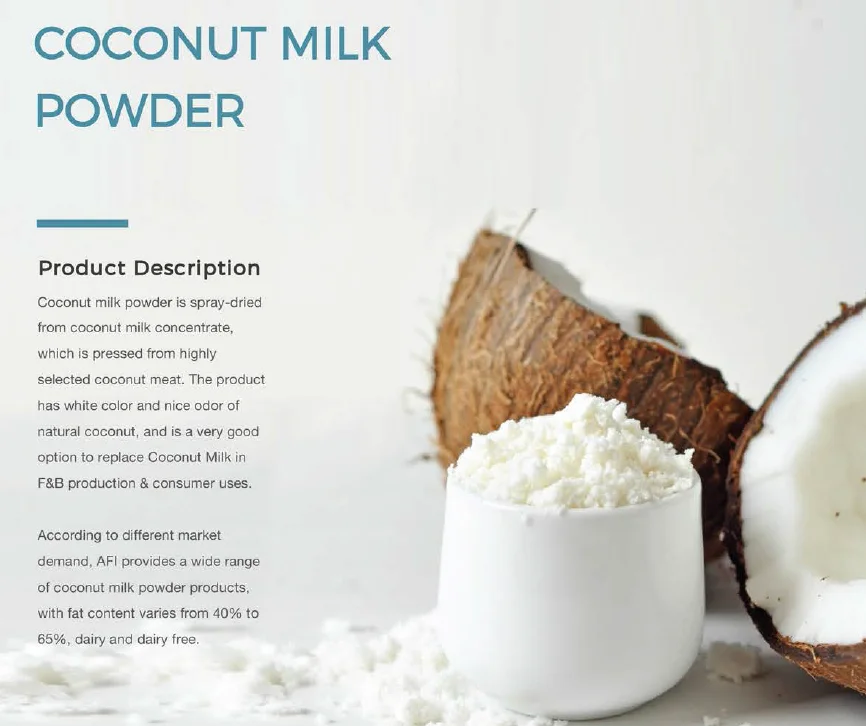 Strain the liquid through muslin cloth and store in the refrigerator.
Strain the liquid through muslin cloth and store in the refrigerator.
Coconut milk for babies is an energy-dense beverage that they can consume along with other weaning foods. Feeding coconut milk to babies under 12 months is strongly discouraged. However, toddlers can consume a cup of coconut milk as their main drink or as a part of other foods such as soups, curries, porridge, and cakes. But never replace whole cow’s milk or breast milk with coconut milk since it lacks certain essential nutrients that babies and toddlers need for proper growth and development. Instead, include coconut milk in moderation as a part of a balanced diet to enjoy its benefits.
Key Pointers
- Babies older than 6 months may occasionally consume coconut milk-based products.
- Coconut milk is nutritious and also available fortified with calcium and vitamins.
- Make sure you buy packaged coconut milk from a reputable and trusted brand and keep the intake occasional for babies.

- Check out coconut milk puree, creamy lentil veggie curry, and other recipes to enhance the nutritional value of your baby’s diet.
References:
MomJunction's articles are written after analyzing the research works of expert authors and institutions. Our references consist of resources established by authorities in their respective fields. You can learn more about the authenticity of the information we present in our editorial policy.
1. Milk free diet for babies; NHS
2. Milk free diet for babies; NHS
3. Cow’s Milk Free Diet for Infants and Children; NHS
4. Coconut milk, FDC ID: 1097553; Fooddata Central; USDA
5. Feeding and nutrition of infants and young children; WHO
6. Kokilavani et al.; Identification of Volatile Compound in Coconut Milk Samples Using GC-MS; International Journal Of Current Microbiology Applied Sciences
7. Asiri N. Karunasiri et al. ; Antioxidant and Nutritional Properties of Domestic and Commercial Coconut Milk Preparations; NCBI
; Antioxidant and Nutritional Properties of Domestic and Commercial Coconut Milk Preparations; NCBI
8. Victor Ephraim Edem et al.; Optimization of Coconut (Cocosnucifera) Milk Extraction Using Response Surface Methodology; International Journal of Nutrition and Food Sciences
9. The Benefits of Coconut Milk; Jamaica Hospital Medical Center
10. Elvira Verduci, et al.; Cow’s Milk Substitutes for Children: Nutritional Aspects of Milk from Different Mammalian Species, Special Formula and Plant-Based Beverages; NCBI
11. SaifAlyaqoubi et al.; Study of antioxidant activity and physicochemical properties of coconut milk (Patisantan) in Malaysia; Journal of Chemical and Pharmaceutical Research
12. Cow’s Milk Alternatives: Parent FAQs; AAP
13. Coconut Allergy; Australian Society Of Clinical Immunology And Allergy
14. Coconut Allergy; Anaphylaxis Campaign
15. Dietary fat and children; Medline Plus; US National Library Of Medicine
The following two tabs change content below.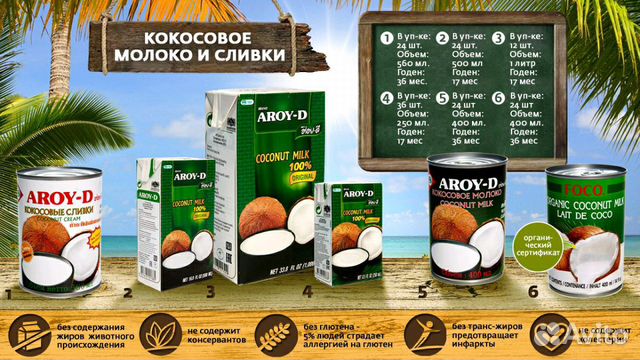
- Reviewer
- Author
7 Healthy Beverages You Should Drink During Pregnancy
7 Healthy Beverages You Should Drink During Pregnancy
Is It Safe To Eat Seaweed During Pregnancy?
Is It Safe To Eat Seaweed During Pregnancy?
Top 10 Food Ideas For Your 14 Months Baby
Top 10 Food Ideas For Your 14 Months Baby
Bread For Babies: Safety, Right Age, Precautions, And Recipes
Bread For Babies: Safety, Right Age, Precautions, And Recipes
Eating Chocolate During Pregnancy: Is It Safe And How Much To Eat?
Eating Chocolate During Pregnancy: Is It Safe And How Much To Eat?
5 Health Benefits Of Eating Lamb During Pregnancy
5 Health Benefits Of Eating Lamb During Pregnancy
Is It Safe To Eat Mayonnaise When Pregnant?
Is It Safe To Eat Mayonnaise When Pregnant?
Is It Safe To Eat Lettuce During Pregnancy?
Is It Safe To Eat Lettuce During Pregnancy?
5 Indian Foods To Avoid During Pregnancy
5 Indian Foods To Avoid During Pregnancy
Allergen f36 - coconut, IgE
Quantitative determination of specific IgE antibodies to coconut, which can cause allergic manifestations in sensitized individuals.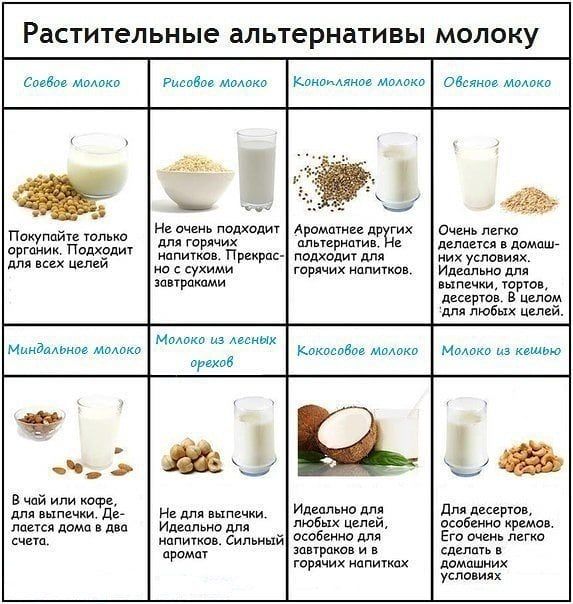
Synonyms Russian
Class E specific immunoglobulins to "coconut".
Synonyms English
Allergen f36 - Coconut ( Cocos nucifera ), IgE; Specific IgE to Coconut.
Test method
Immunochemiluminescent assay.
Units
kU/l (kilo unit per litre).
What biomaterial can be used for research?
Venous blood.
General information about the study
Coconut is a fruit (often erroneously called a "nut") of the fruit tree of the palm family. The coconut palm is native to the tropical regions of Southeast Asia, but is currently grown in the tropical regions of North, Central and South America, Africa. Coconut is the most important food in Asia. nine0003
The coconut palm is a long-lived tree with a single trunk, reaching a height of 30 m, with pointed or long hanging leaves at the top.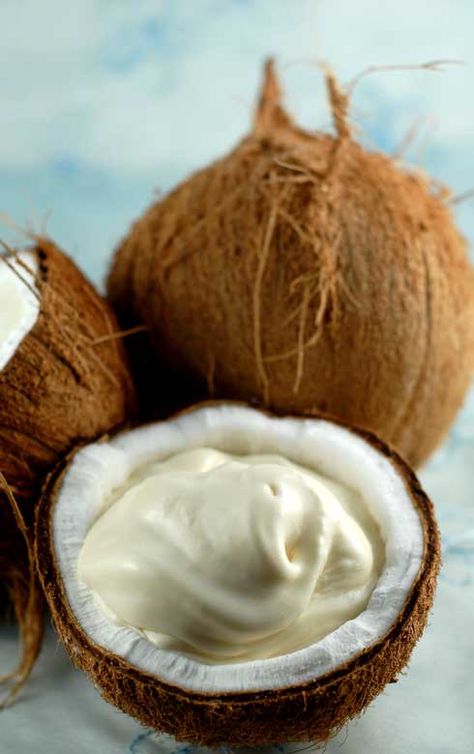 A year on one tree grows from 90 to 200 fruits. The middle of the fruit contains a partly liquid (coconut milk), partly solid (coconut flesh) single seed.
A year on one tree grows from 90 to 200 fruits. The middle of the fruit contains a partly liquid (coconut milk), partly solid (coconut flesh) single seed.
People use all parts of the coconut tree. The inedible parts of the coconut are used to make home coverings, fertilizers, charcoal, timber, furniture parts, tools, filters, and various handicrafts. Coconut coir (coconut fiber) is sometimes included in mattresses. The pulp of the fruit is eaten raw or cooked, as part of many dishes. Palm wine and vinegar are made from the juice. The apical buds of the tree are used as food in some countries as "palm cabbage". Coconut milk, extracted from unripe nuts, is consumed both fresh and fermented. The dried pulp of coconuts is used in the preparation of confectionery, and coconut oil is widely used as margarine. Coconuts contain a large amount of protein, as well as lauric acid, which in the body turns into monolauryl, which has antiviral, antibacterial and antiparasitic properties. Coconut oil is used in cosmetology, soap making, as well as in the pharmaceutical industry.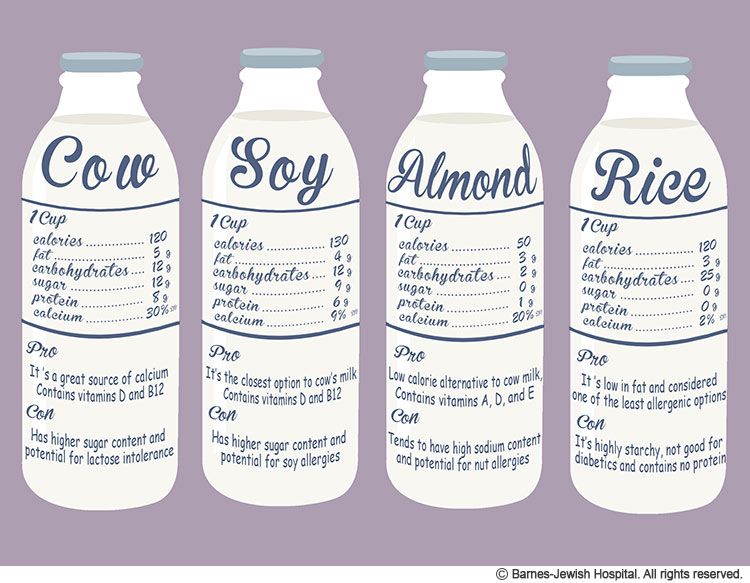 nine0003
nine0003
Coconut is a hypoallergenic food but is a rare but possible cause of allergic reactions in sensitized individuals. Several allergens have been isolated from coconut, one of which is immunologically similar to soy storage protein. Despite being very distantly related, cross-allergic reactions between coconut, walnut and hazelnut are possible. However, individuals sensitized to coconut may not have reactions to other nuts, and vice versa.
Allergy to this food product may manifest as itching in the mouth, cough, shortness of breath, bronchospasm, reddening of the skin, angioedema, urticaria, abdominal pain, nausea, vomiting. In rare cases, severe life-threatening anaphylactic reactions can occur after eating coconut. Isolated cases of the development of severe gastrointestinal disorders in infants who received a mixture with coconut oil in the composition are described, in which sensitization to coconut was confirmed using skin prick tests and provocative tests. Allergy to coconut can occur in individuals who have repeatedly consumed this fruit without any reactions.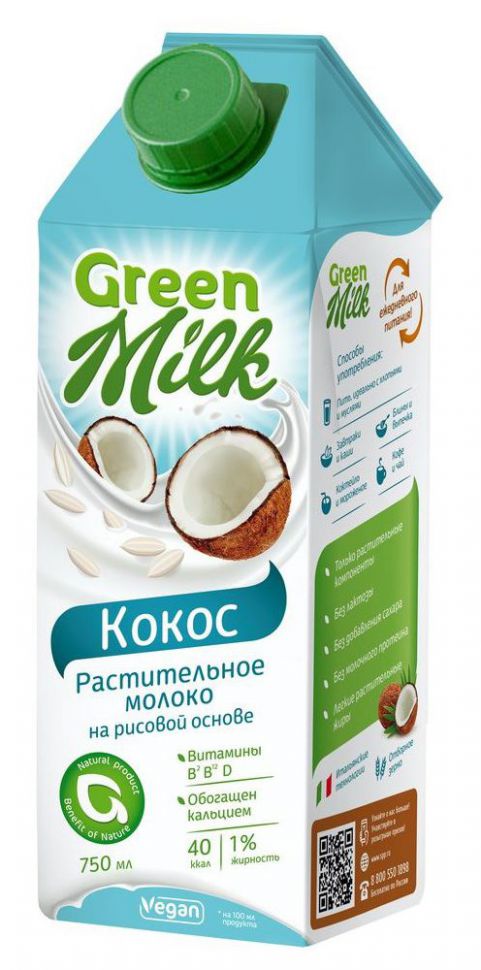 A sensitization to coconut can be either isolated or combined with an allergy to other foods. nine0003
A sensitization to coconut can be either isolated or combined with an allergy to other foods. nine0003
More often than not food allergies occur, but allergic contact dermatitis when lotions, shampoos, soaps and other care products containing coconut and coconut oil derivatives are applied to the skin. The possibility of primary sensitization to coconut just through the skin is not excluded. There are known cases of allergic rhinitis, rhinoconjunctivitis and bronchial asthma in persons sensitized to coconut pollen.
What is research used for? nine0006
- Detection of sensitization to coconut in children and adults;
- identification of possible causes of an exacerbation of an allergic disease (allergic rhinitis / rhinoconjunctivitis, bronchial asthma, atopic dermatitis, angioedema, gastrointestinal disorders).
When is the examination scheduled?
- For suspected coconut allergy in children and adults;
- when examining patients with skin rashes, angioedema, redness and burning of the eyes, swelling of the eyelids, lacrimation, sneezing, congestion, rhinorrhea, itching in the mouth, cough, shortness of breath, bronchospasm, nausea, vomiting, diarrhea after eating coconut; nine0060
- if skin testing is not possible.

What do the results mean?
Reference values: negative.
Cause of positive result:
- coconut sensitization.
Reasons for the negative result:
- no sensitization to this allergen;
- prolonged restriction or exclusion of contact with the allergen.
Important Notes
- This test is safe for the patient compared to skin tests (in vivo) as it eliminates patient exposure to the allergen.
- The use of antihistamines and age characteristics do not affect the quality and accuracy of the study.
Also recommended
[02-029] Clinical blood test: complete analysis, leukocyte count, ESR (with blood smear microscopy if pathological changes are detected)
[08-017] Total immunoglobulins E (IgE) in serum
[21-673] Allergochip ImmunoCAP ISAC (112 allergen components)
[21-074] Allergen f14 - soybeans, IgE -25 Allergen f256 - walnut, IgE
[21-055] Allergen f20 - almond, IgE
[21-648] Allergen f92 - banana, IgE (ImmunoCAP)
[21-541] Food allergen mixture No.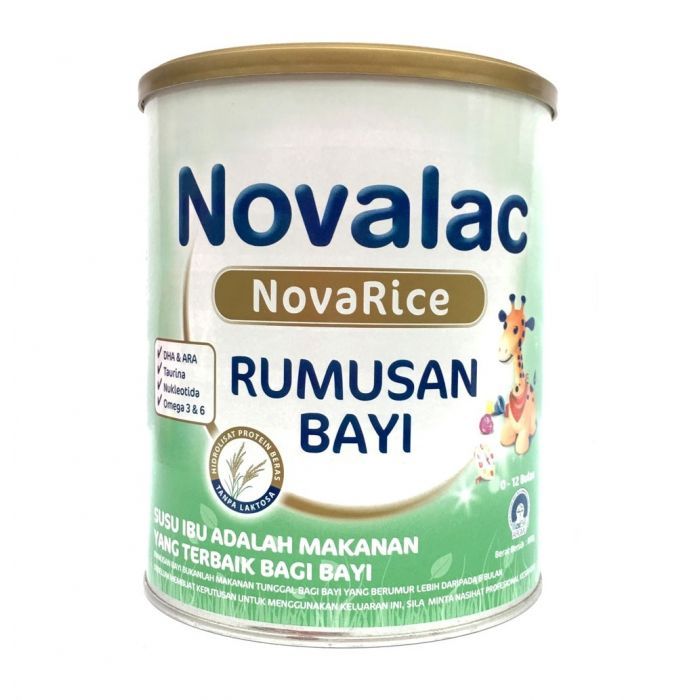 1 (IgE ): peanut, almond, hazelnut, coconut, Brazil nut + determination of class E specific immunoglobulins to other allergens
1 (IgE ): peanut, almond, hazelnut, coconut, Brazil nut + determination of class E specific immunoglobulins to other allergens
Who orders the test?
Allergist, gastroenterologist, pediatrician, therapist, general practitioner.
Literature
- Teuber SS, Peterson WR. Systemic allergic reaction to coconut (Cocos nucifera) in 2 subjects with hypersensitivity to tree nut and demonstration of cross-reactivity to legumin-like seed storage proteins: new coconut and walnut food allergens. J Allergy Clin Immunol 1999;103(6):1180-5. nine0059 Rosado A, Fernandez-Rivas M, Gonzalez-Mancebo E, Leon F, Campos C, Tejedor MA. Anaphylaxis to coconut. Allergy 2002;57(2):182-3.
- Nguyen SA, More DR, Whisman BA, Hagan LL. Cross-reactivity between coconut and hazelnut proteins in a patient with coconut anaphylaxis. Ann Allergy Asthma Immunol 2004;92(2):281-4.
- Tella R, Gaig P, Lombardero M, Paniagua MJ, Garcia-Ortega P, Richart C.
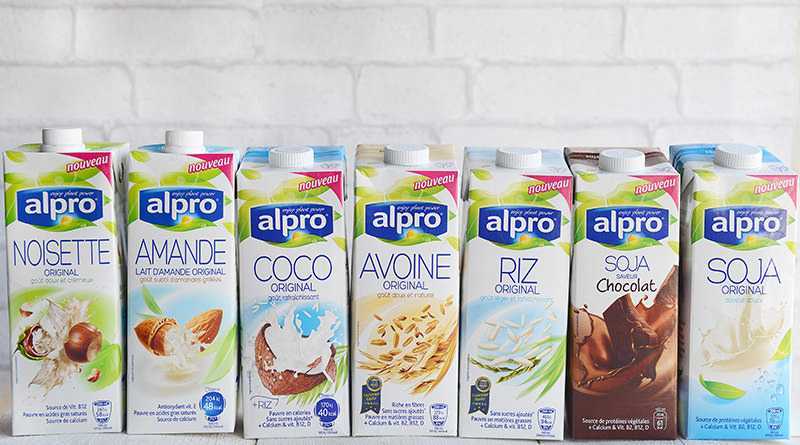 A case of coconut allergy. Allergy 2003;58(8):825-6.
A case of coconut allergy. Allergy 2003;58(8):825-6. - Couturier P, Basset-Stheme D, Navette N, Sainte-Laudy J. A case of coconut oil allergy in an infant: responsibility of “maternalized” infant formulas. [French] Allerg Immunol (Paris) 1994;26(10):386-7.
- Newhall KK, Amoruso LS, Sinacore JM, Pongracic JA. Presence of common food allergens in commercially available pediatric skin care products. J Allergy Clin Immunol 2004:113:S235.
- Karmakar PR, Chatterjee BP. Cocos nucifera pollen inducing allergy: sensitivity test and immunological study. Indian J Exp Biol 1995;33(7):489-96.
- Wittczak T, Pas-Wyroslak A, Palczynski C. Occupational allergic conjunctivitis due to coconut fiber dust. Allergy 2005;60(7):970-1.
- Anagnostou K. Coconut Allergy Revisited. Children (Basel). 2017 Oct; 4(10): 85.
About coconut milk - Chaika Clinics
I would like to know a little about the classic, lactose milk: is it really so harmful, causes rashes, or is it still more an individual intolerance?
Classic cow's milk can cause several diseases: the most significant are lactose intolerance and allergy to cow's milk protein.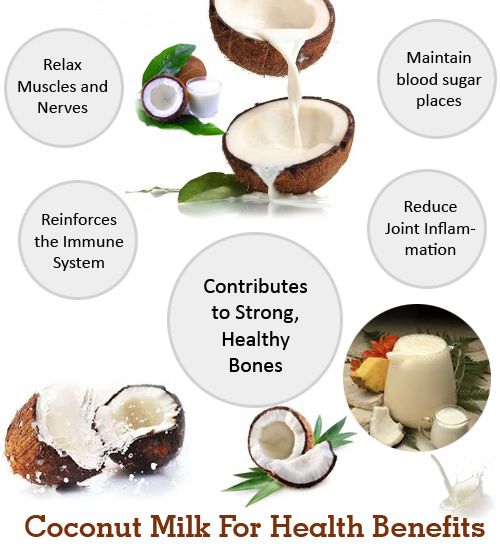 Lactose intolerance is a condition where the body has difficulty digesting milk and dairy products. If you have lactose intolerance, you may experience diarrhea, bloating, and abdominal pain in response to eating dairy products. nine0003
Lactose intolerance is a condition where the body has difficulty digesting milk and dairy products. If you have lactose intolerance, you may experience diarrhea, bloating, and abdominal pain in response to eating dairy products. nine0003
Lactose deficiency is most common in Indians, Asians and Africans. Normally, a person produces an enzyme that breaks down lactose (the main milk sugar). In people with lactose intolerance, the body does not make enough of this enzyme or it does not work well. Sometimes some infections temporarily disrupt this ability, but after a few days it is restored. Luckily, people with lactose intolerance can take enzymes to help with this problem. nine0003
There is a significant difference between cow's milk protein allergy and lactose intolerance. With lactose intolerance, a person reacts to lactose, which is sugar. And with an allergy to cow's milk protein - to protein. And an allergic reaction is an inflammatory reaction, which is unusual for lactose intolerance.
Is lactose less digestible with age? Can lactose intolerance develop in adulthood?
Yes, maybe. The enzyme that breaks down lactose is called lactase. Its formation is encoded by a certain gene; over time, the activity of this gene may decrease. The undigested milk sugar (lactose) then enters the intestines, where it is digested by bacteria, producing large amounts of gas. According to the US National Institutes of Health, 65% of people in adulthood have a reduced ability to digest milk compared to infancy. nine0003
Diseases of the small intestine (as well as surgery, radiation, infections) can also lead to lactase deficiency. Just like drinking raw water.
Who definitely shouldn't drink cow's milk?
People diagnosed with lactose intolerance and allergy to cow's milk protein. Drinking sheep's or goat's milk does not save the situation much, since there is also lactose there. If you have lactose intolerance, you need to study the composition of the products, since milk or lactose can be added to those products where you did not expect to see them. For example, some soups, cereals or salad dressings. Look for words on labels such as "milk", "lactose", "milk powder", "whey". nine0003
If you have lactose intolerance, you need to study the composition of the products, since milk or lactose can be added to those products where you did not expect to see them. For example, some soups, cereals or salad dressings. Look for words on labels such as "milk", "lactose", "milk powder", "whey". nine0003
But coconut milk - why is it fundamentally healthier than cow milk?
Coconuts and their products are now at the peak of popularity. The stars show that they only drink coconut milk, especially after yoga. Over the years, coconut oil has gone from junk food to superfood. Nutritionists advise eating coconut milk for fat burning! But is it safe for children?
Do not use coconut milk in place of breast milk or formula. Even cow's milk in infants can lead to severe anemia and dehydration due to its composition. And coconut milk is no better in that regard. nine0003
If your child is allergic to cow's milk protein or lactose intolerant, the doctor will prescribe a soy formula.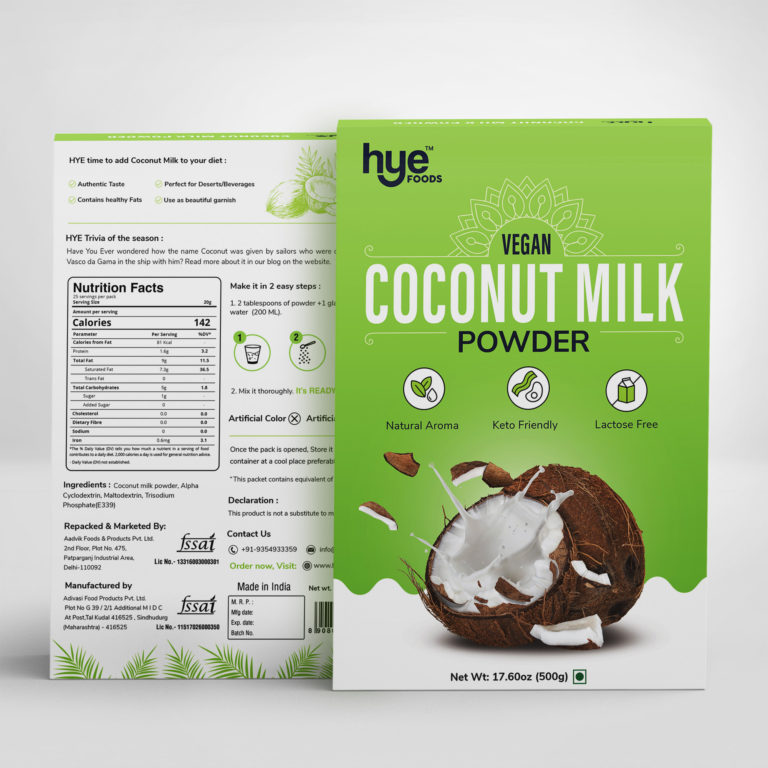 And if he is allergic to soy, then a hypoallergenic mixture, but not coconut milk.
And if he is allergic to soy, then a hypoallergenic mixture, but not coconut milk.
Is it possible to give coconut milk to children who have celebrated their first birthday?
One cup of canned coconut milk contains 57 grams of saturated fat, which is 255% of the daily value of saturated fat... Commercial brands of coconut milk-based drinks contain enough water to reduce fat, but they often contain sweeteners and thickeners that Nothing good for kids either. The good news is that these drinks can be fortified with B vitamins, vitamin D, iron, and calcium. nine0003
Is there anything special about him?
Coconut milk is a good source of niacin, iron and copper. If your older kids love it, they can drink it. But remember that canned coconut milk contains no protein at all and cannot replace cow's milk as a protein food for a growing baby.
Who would you recommend switching to?
In view of the foregoing, only a doctor can make such a recommendation in certain, rare circumstances.